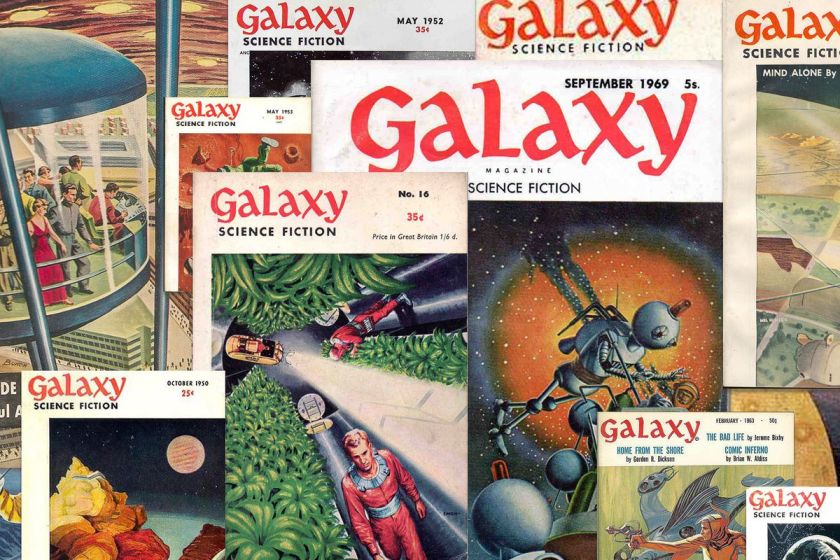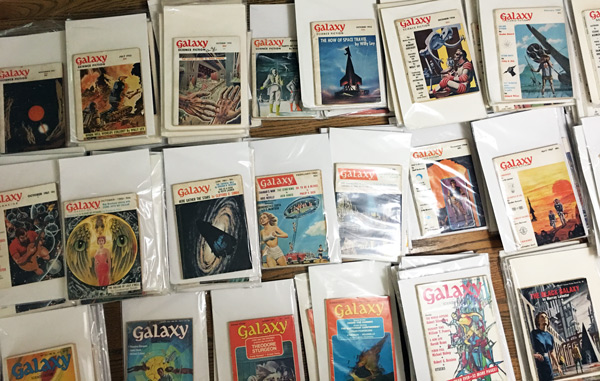by James Wallace Harris, Friday, August 9, 2019
A few weeks ago I watched “Galileo’s Moon” on the PBS show Secrets of the Dead. It was about a copy of Sidereus Nuncius (1610) by Galileo showing up for sale, one of the most famous science books in history, and it even had Galileo’s signature. The show was about how antiquarian book dealers and scientists worked to authenticate rare books. I thought it would be wonderful to own such a significant piece of history, and it disturbed me that rich people could buy these timeless treasures for themselves.
I’ve long wanted to own a rare scientific book and wondered if I could afford any volume published before 1700. Books by Galileo run in the hundreds of thousands to the millions. I’m sure I could probably find something I could afford, but it’s doubtful I would have ever heard of it.
During the course of the show, they interviewed Marino Massimo De Caro whose home was a museum to Galileo, astronomy, and space history. I realized if you’re going to own such unique treasures you have to preserve and maintain them. Anything that’s over 400 years old needs to be protected so it might exist for another 400 years, or even 4,000 years. I couldn’t handle that responsibility.
Then I saw three lots of Galaxy Science Fiction on sale at eBay. I already have access to all its issues as digital scans, so I didn’t need reading copies. However, I decided it would fulfill my desire to own something historic. Of course, old science fiction magazines won’t be historic to 99.9999% of Earthlings, but among the people who know the history of science fiction magazines, they would be. There were 355 issues published between 1950 and 1976 and I got 165 of them, just under half. Quite a purchasing coup.
One reason I even checked eBay to see if they were available is that I’m reading, Galaxy Magazine: The Dark and the Light Years by David L. Rosheim. And I read it because I just finished reading The Way the Future Was a memoir by Frederik Pohl who edited Galaxy in the 1960s. Between those two books and other science fiction histories I’ve been reading, I know how important Galaxy Science Fiction was to the genre in the 1950s and 1960s. I started reading Galaxy in the mid-1960s and had collected many back issues then. By 1971 I was even trying to collect the earliest science fiction magazines. My first purchase of pulps was four issues of Amazing Stories from 1928. Amazing Stories began in April 1926 and was the first science fiction magazine. In 1975 I sold all my magazines and decided not to collect anything anymore. Owning objects is a burden, especially stuff that takes a lot of movers to relocate.
In the last couple of years, I’ve rekindled my love of old science fiction magazines but I’ve satisfied my need for them with digital scans I get off the internet. If I hadn’t seen that program about Galileo I doubt I would have had that hunger to own something old. But it’s given me great delight to bid for them on eBay and win the bid. And it’s been big fun going through the issues. But I now realize I’m in the same situation as big-time collectors of rare books – how do I protect and preserve my pieces of history?
I got these Galaxy magazines pretty cheap, so they aren’t precious. But they are historical in a tiny way, and they are disappearing. Most people throw away magazines. I bet my wife will throw these magazines away when I die. I’ll need to make a provision in my will to give them to someone who will cherish them too. However, I would assume such people would also be dying out, but a few lovers of old magazines are born in every generation.
On Facebook, Twitter, and eBay I meet people who collect much older magazines. Today I met a young man online who collects 19th century Dime Novels. If these issues of Galaxy are preserved, there will be a handful of people in the 22nd century that will want them. I could increase their value if I would track down and buy all the other issues too. I might, but I’m already feeling the burden of their weight on my Buddhist soul. I will probably enjoy these issues for a couple years and then sell them.
Even if I could afford a copy of Sidereus Nuncius, I doubt I’d want to own it long. Old stuff really belongs in museums and libraries so everybody can enjoy them.

JWH (Happy Birthday Jim Connell)


Just recently I’ve been watching some episodes of “Jay Leno’s Garage” on YouTube. You may or may not know that Leno is an automobile enthusiast and collector. His “garage” however isn’t just the usual rich man’s indoor parking facility, but something very like a museum, complete with maintenance/restoration staff and a bunch of classic cars displayed in themed collections along with historic photos and documents, engine cutaway models, etc. One might as well be in the Smithsonian and it must all cost a fortune.
I don’t know if the facility is open to the public at all, but Leno has been sharing his collection via an internet video show. The videos I’ve seen feature a single car per episode and include a brief history, an exploration of unique mechanical or design features, and a drive around the neighborhood. They are filmed in a rather talky show & tell format rather than the flashy quick cut/low info editing one typically sees nowadays. I’ve been watching some very interesting episodes featuring various steam-powered autos and am surprised at how much info is conveyed about the mechanics and operation of these vehicles.
Here’s an episode that might be of particular interest to an SF fan who grew up in the 50’s:
1963 Chrysler Turbine: Ultimate Edition – Jay Leno’s Garage
I myself have owned a few items of historical interest and if one has any sense of responsibility at all, it really is something of a burden. I was never a fan of Leno as a performer but he’s created a legacy here that I greatly admire. Even if his collection doesn’t outlive him, the videos might.
I don’t know what I’d do if I came across a bundle of old SF magazines. My house is full of junk and clutter already, and there are simply too many books already. Fortunately, if that’s the word, you just about never see old SF magazines where I live, and it’s too expensive to order them. Besides, as you say, you can access the content of many, perhaps most, of them.
The only physical copy of Galaxy I’m ever likely to see is the August 1954 issue. That’s the month I was born, and a friend gave it to me as a present. She spotted it at a used book outlet in Singapore, of all places, while she was traveling.
The oldest books I have are two from the late 19th century. Both are by the British naturalist, Richard Jefferies, who, interestingly enough, has entries in ISFDB and the Encyclopedia of Science Fiction. They’re non-genre books, though: Hodge and His Masters and Round About a Great Estate.
I started reading GALAXY in the early 1960s. Loved it! When my family took a trip to the New York World’s Fair, I managed to visit Gerry de la Rey’s bookstore in NYC and bought dozens of early issues of GALAXY (they were cheap back then!). A complete set of my GALAXY collection now resides at the Special Collections Library at the State University of New York at Buffalo.
Like Piet, I have way too many books, magazines, and music CDs. I’m trying to buy less and donate more (I don’t want to stick my kids with the chore of disposing of all my “stuff”). But holding those early issue of GALAXY and reading those classic stories thrilled me as a kid. It doesn’t get much better than that!
I think you should hang on to those magazines. Today’s blah, tomorrow’s treasure ☺but I empathize with your comments about not wanting to own a lot of things. I’ll never manage to put all my belongings in a backpack so I can set off at a moment’s notice, but that’s my ideal
Hi James
I understand you concerns, the room where I keep my SF treasures including the magazines is stuffed and my wife and I have more general SF in the basement and plans to convert the biggest room down there to a library, every other room except the bathrooms are stuffed with books, ceramics and art and we just completed participating in a kickstarter for Etherfields, a game that will come with a huge number of cards, figurines etc. And with all that said after seeing your haul I was tempted to look on Ebay. I have dvd’s and anthologies with more SF stories than I can ever read plus the novels but I still love the slightly smelly originals and some of the covers you showed I have never seen. So I am a bit jealous at the same time. My advice, just enjoy them.
The things that make us happy make us wise.
John Crowley Little Big
Guy